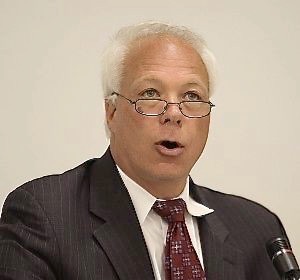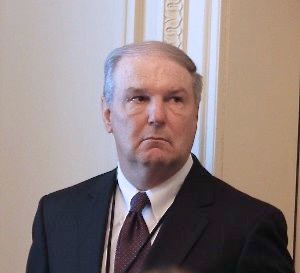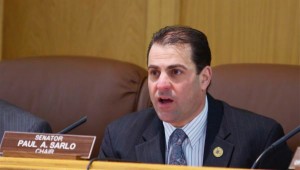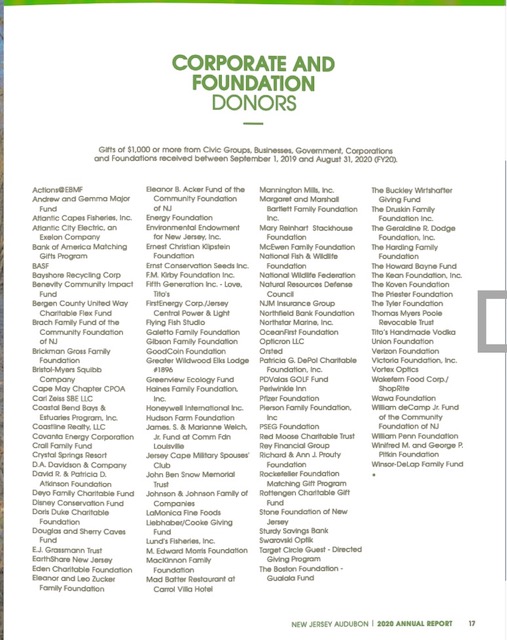The Exxon PlayBook Has Been Deployed In NJ For Decades
Manufacture Scientific Uncertainty To Delay & Weaken Legislation & Regulation
Corrupt Legislators, Lie To The Public, Deploy Green Cover Groups, Capture Regulators, & Dupe A Gullible Media
Hide Polluting Corporations Behind The “Umbrella” Of The NJ Chemistry Council & NJ Business and Industry Association
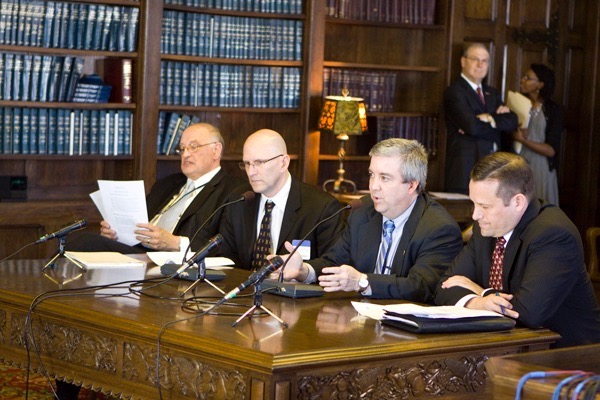
Farm Bureau Sits on Murderers Row, seeks Regulatory Rollbacks: (L-R) Hal Bozarth (Chemistry Council); Lobbyist (Farm Bureau); Michael Egenton (Chamber of Commerce); & Dave Brogan (NJ Business and Industry Assc.). Jim Benton NJ Petroleum Council (rear) looks on from the shadows. (3/18/10)
Dennis Hart of the NJ Chemistry Council and Ray Cantor of NJ Business and Industry Association (NJBIA) have some explaining to do. The NJ press corps likes to quote these two corporate lobbyists, almost always in a very favorable light and almost always without disclosing their revolving door corruption (and the flip side of the revolving door corruption, which is known as “regulatory capture”).
But that all must change because Exxon-Mobil’s Washington DC lobbyists just spilled the beans on Exxon’s corrupt strategy for dodging accountability for climate destruction and toxic pollution, while boosting corporate profits.
In an historic sting operation, Exxon’s top DC lobbyists were duped – by Greenpeace UK of all people – into thinking they were talking to job recruiters. Before you go any further, please read this remarkable story and watch all the astonishing Zoom videos here (the expose is called “Unearthed):
The Washington Post wrote an overview of the proliferating national scandal, see:
- An Exxon lobbyist thought he was in a job interview. Instead, it was a secretly recorded Zoom call. –
The tape, recorded by Greenpeace UK, has sent ripple effects through Washington, with one top Democratic lawmaker asking for Exxon’s CEO to testify in Congress about the company’s communication on climate change.
In addition to climate, the Exxon playbook also involved PFAS (forever chemicals), toxic chemicals, and plastics:
Over the coming days, Unearthed, will also reveal: (Unearthed)
- Claims that Exxon covertly fought to prevent a ban on toxic chemicals
- How Exxon is using its playbook on climate change to head-off regulations on plastic
The Exxon lobbyist implicated NJ Chemistry Council (Mr. Hart) and NJ BIA (Mr. Cantor) in their corrupt campaign, but noting how Exxon and the national associations worked with State level associations.
So, because NJ is a heavily petrochemical state, and I work on these specific NJ State level issues, and especially because the Exxon fools highlighted how they work through State level Associations, I want to frame some of the NJ dimensions of this story, in hopes that the otherwise lame NJ press corps can ask a few questions of former DEP officials Dennis Hart (NJ Chemistry Council) and Ray Cantor and Michele Sikierka (NJ BIA), who they rely on so often as credible Trenton sources, often without even mentioning the DEP revolving door (that’s you, NJ Spotlight!)
Given that “forever chemicals” (PFOA, PFAS), plastic bans, and climate regulation (DEP PACT) are controversial issues now pending in NJ, one would expect that Dennis Hart (NJ Chemistry Council) and Ray Cantor (NJBIA) would face some tough questions from NJ press corps and Legislators, based on the Greenpeace “Unearthed” expose.
(oops, how did I forget Jim Benton of the NJ Petroleum Council – He was never with DEP as far as I know. Is he still there?)
1. Hide Corporate Polluters Behind Associations
Corporations don’t like bad press and they hate public accountability.
The Exxon lobbyist admits that and highlights how working behind the “umbrella” of various industry associations accomplishes these corporate objectives.
Now the companies feed into that [lobbying Coalition], but the public face is the Associations.
Right here in NJ, major corporate polluters use exactly the same tactic and hide behind the NJ Chemistry Council and NJ BIA.
NJ environmental groups let them get away with that and very rarely publicly call out a corporate polluter.
Even the various NJ DEP public reports explicitly format the data to hide the identities of specific corporate polluters (just look at the DEP’s Pollution Prevention data reporting format and the DEP’s greenhouse gas emissions inventory for examples of this abuse)
Will media ask specific question and get behind the facade of these “umbrella” associations? ASK Dennis Hart, NJ BIA President and CEO Michele Siekerka, Communications Officer Bob Considine, and lobbyist Ray Cantor! (all of them revolving door former DEP officials in the notoriously anti-environment Christie Administration).
And it’s not just pro-business Republicans – the revolving door corruption is bi-partisan (e.g. see a recent NJ Spotlight)
[Dennis Hart of the NJ Chemistry Council] was encouraged by a commitment to look at why the regulatory process is so long and costs so much more than other states.
“If this new executive order leads to discussions and positive impacts on streamlining the regulatory and permit program and reducing the fees and costs of doing business in New Jersey, we fully support it and are ready to start working on those issues right now,’’ he said.
Unlike that Spotlight puff piece, we explained how NJ Gov. Murphy’s regulatory policy was virtually the same as Gov. Christie’s.
2. Promote Market Based Tools Over Strict Regulation
This element of the Exxon – corporate playbook is what brought us the Regional Greenhouse Gas Initiative (RGGI) and the toothless Global Warming Response Act, instead of strict DEP regulation of greenhouse gas emissions
By the start of the Obama administration in January 2009, it had become untenable for ExxonMobil to continue to publicly cast doubt on climate science.
Instead, ahead of Obama’s inauguration, and in an apparent break with Exxon’s long opposition to what it called “near-term policies” on climate change, the company’s then-CEO Rex Tillerson publicly backed a carbon tax.
The proposal sought to spread the cost of tackling climate change beyond the fossil fuel sector, taxing businesses in every sector of the economy for each tonne of carbon emitted – either by them directly or embedded in products they sell to consumers. The cost of this would then be passed on to the public.
In making the announcement, Tillerson sketched the outlines of a new ExxonMobil playbook on climate change – one that accepts the science but nevertheless seeks to delay rapid emissions cuts.
This ineffective market based approach as an alternative to strict regulation continues today as an across the board ideological plank of current pro-corporate environmental policy, which has effectively abandoned strict regulation.
Even the so called “environmental groups” embrace this corporate policy.
Will NJ media expose the corporate roots of this policy?
Will they explicitly compare ineffective market based tools with strict regulation?
3. Deny Science And Manufacture Uncertainty To Avoid, Delay, And Weaken Regulation

Dr. Tardiff, hired gun for Dupont. His August 7, 2009 presentation of to the NJ Drinking Water Quality Institute scientists. Tardiff presented his own PFOA risk assessment to challenge the DEP risk assessment findings.
It’s long been known and reported that Exxon has denied and polluted the climate science, but it’s not nearly as well known that this strategy is used across the board in all realms of environmental policy.
I’ve been writing about specific examples of “manufacturing uncertainty” for a very long time. see:
- Dupont: Doubt (And Intimidation) Are Their Product
- Should the Chemical Industry Have a Role in Writing Your Drinking Water Standards?
- NJ Chemical Industry Invokes Gov. Christie’s Executive Order to Block DEP Drinking Water Standards for Toxic Chemicals
- Winston Smith Pays A Visit To The Drinking Water Quality Institute
- DRBC Fracking Ban Manufactures Doubt On Climate Impacts Of Methane
- Murphy DEP “Forest Action Plan” Sparks Controversy Over Conflicts With Climate Goals And Logging State Lands
The NJ examples of this particular tactic in the Exxon corporate playbook are legion.
But no one talked about any of this: (e.g. see: Dupont – Too Big to Jail)
In response to recommendations by DEP scientists:
- Dupont hired experts to manufacture uncertainty and challenge the DEP’s scientific risk assessment of PFOA;
- Dupont intimidated and attacked the integrity of the DEP scientists, and
- Dupont lobbied the DEP Commissioner to block application of DEP science in DEP regulations and drinking water standards(which drive toxic site cleanup).
When will the NJ press corps start to apply thisExxon playbook framework explicitly in their questions to corporate polluters and the narrative of their news coverage?
4. Corrupt The Legislative Process
An important part of the Exxon-corporate playbook is not only to do traditional lobbying, but to hijack the legislative process by actually writing proposed legislation:
We would prefer model legislation that the American Chemistry Council would put forth to say, a super-progressive member of Congress that puts forth comprehensive legislation. We prefer it come from us, rather than them.
Other tactics include seeking “moderates” – like NJ Senate President Sweeney and Senate Environment Committee chairman Bob Smith:
When asked which senators Exxon is lobbying on these specific points, McCoy said: “Senator [Shelley Moore] Capito [Republican senator for West Virginia]… who’s the ranking member of environment and public works. Joe Manchin, I talk to his office every week, he is the kingmaker on this because he’s a Democrat from West Virginia which is [a] very conservative state, so he is, and he’s not shy about sort of staking his claim early and completely changing the debate.”
Senator Paul Sarlo (D-Bergen), Chair of Budget & Appropriations Committee – where good bills go to die (Toms River – 2/11/13)
“On the Democrat side we look for the moderates on these issues”, McCoy continued, highlighting figures including Arizona senator Kyrsten Sinema; John Tester, senator for Montana; and Chris Coons, senator for Delaware, President Biden’s home state.
“Senator Coons… has a very close relationship with Senator [President] Biden, so we’ve been working with his office – as a matter of fact our CEO is talking to him next Tuesday and having those conversations and just teeing it up, and then that way I can start working with his staff to let them know where we are on some of these issues,” McCoy said.
The Exxon Zoom scandal (who’s zoomin’ who?) has prompted outrage and calls for Congressional Legislative oversight in Washington. As the Washington Post reported:
The tape, recorded by Greenpeace UK, has sent ripple effects through Washington, with one top Democratic lawmaker asking for Exxon’s CEO to testify in Congress about the company’s communication on climate change.
But can anyone even imagine NJ Senate Environment Committee Chairman Bob Smith holding hearings to demand accountability from NJ corporate polluters or their lobbyists?
Or asking DEP some tough questions, not only on climate, but the many other issues I document above that were raised in the Exxon Zoom?
5. Deploy Green Cover – Corporate Co-Optation Of Environmental Groups
The Exxon lobbyist highlighted the use and funding of “shadow groups”. Nothing new there.
But right here in NJ, big corporate polluters – including such “progressive” corporations like PSE&G – routinely use NJ “environmental groups” for exactly the same reasons.
These “shadow groups” include Sustainable NJ, NJ Future, NJ Audubon Society, NJ League of Conservation Voters, and sadly now even NJ Conservation Foundation, Highlands Coalition, and Environment NJ – all of whom take various forms of corporate money (take a look at THIS from NJ Audubon’s most recent Annual Report (will press ask NJ Audubon CEO Eric Stiles any critical questions about how this corporate funding impacts their work?).
Does anyone else find it extremely revealing that NJ Audubon groups Foundations with Corporate donors? They share the same ideology and corporate values and corrupt approach to public policy.
Again, I’ve written about this gross corruption and co-optation many times.
Why is it a taboo topic for real activists and NJ media investigation?
6. Capture The Regulators – Gut regulations and Fast Track DEP Rubber Stamp Of Permits
They say a picture is worth 1,000 words, so I guess I don’t have to write any more about the above photo. For details of that, see:
We’ll now close this brief overview of what we hope is an expanding story with legs.
We hope that the lame stenographers in NJ media get off their asses and do some investigative work to hold the corporate polluters and DEP accountable.
And that the “green groups” and their corporate Foundation funders and naive members wake up.
[End Note: and I took all these photos – not like the current crop of frauds who download crap from the internet.]

